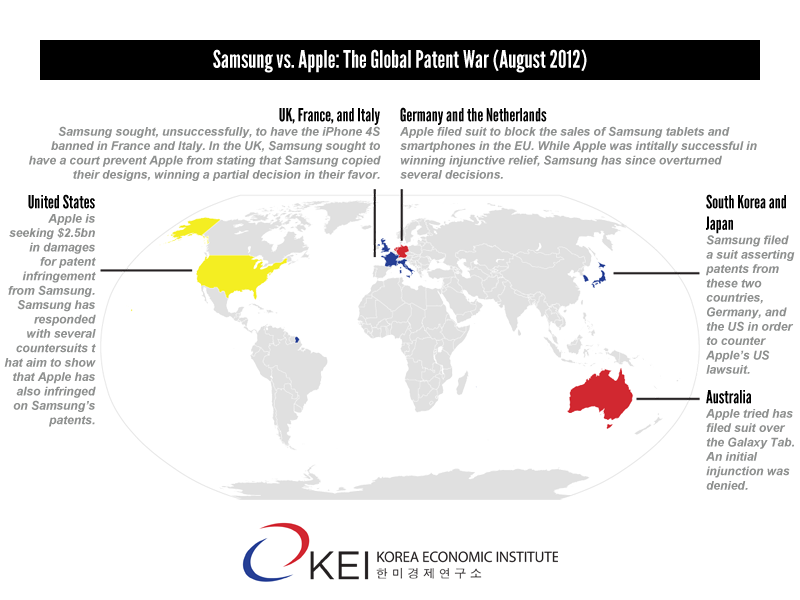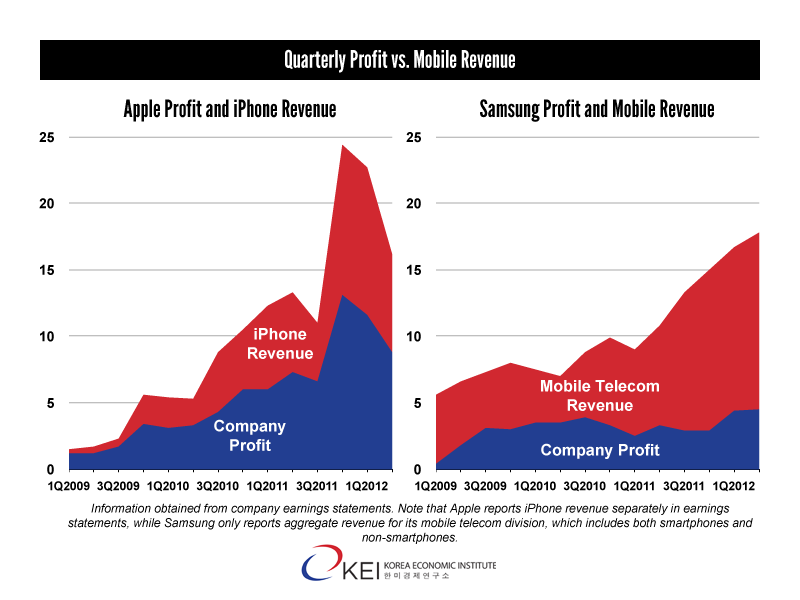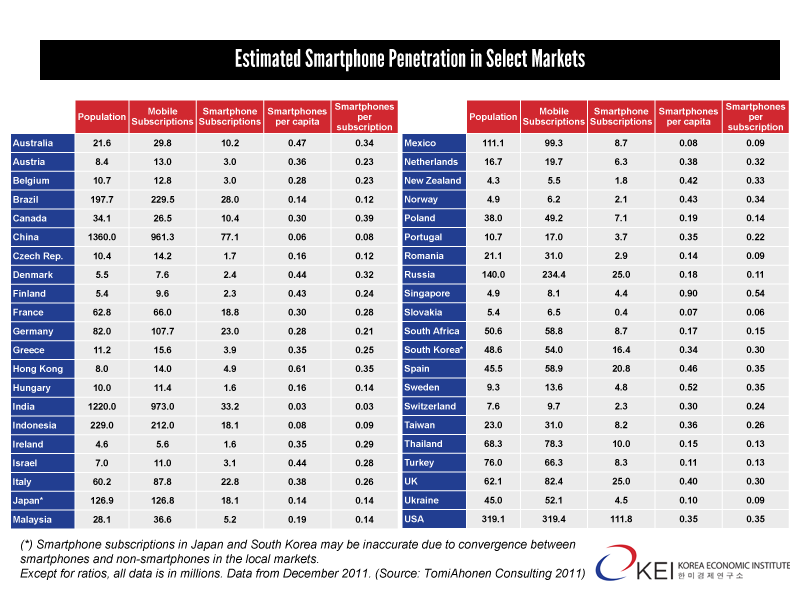The Peninsula
Samsung vs. Apple: An Overview of the Ongoing Legal War over Mobile Devices
Published July 31, 2012
Category: South Korea

By Matthew Tranquada
On Monday morning, in a federal courtroom in San Jose, lawyers for Samsung and Apple met to pick a panel of 10 jurors to decide a case worth $2.5 billion in damages for patent infringement. At the heart of the case is Apple’s contention that Samsung’s designs of its Galaxy series of smartphones and tablets infringes on the look and feel of Apple’s devices, many elements of which are patented. This has already resulted in preliminary injunctions against the import and sale of Galaxy Tab 10.1” tablets and Galaxy Nexus smartphones.
Of course, this is far from the only legal battle being waged by the two companies in what has alternately been referred to as a “mobile device war” or “mobile patent war”. Since April 2011, Samsung and Apple have launched over 30 lawsuits on four different continents, with both sides arguing that the other has infringed their intellectual property. At stake are the lucrative profits in the rapidly expanding mobile device space, especially as consumer adoption of smartphones increases and the functionality of tablets improves to rival traditional PCs.
While the two companies lock horns in courtrooms around the world, though, they have quickly gobbled up 54% of the global smartphone market by some estimates. At the same time, several other phone makers have seen their share of the market severely diminished as Samsung and Apple pump out popular handset after popular handset. Nokia and Research in Motion (RIM) have moved from dominant positions within the smartphone market to near paupers, forced to layoff workers and drastically alter their business plans to counter their decline. Taiwanese manufacturer HTC, once the darling of the Android OS segment of the market and partners with Google on the Nexus One phone, has seen sharp declines in sales. Motorola Mobility and Palm, Inc. were swallowed up by Google and HP, respectively, after their smartphone strategies failed to win over consumers. And Sony and LG have, for the most part, failed to find solid footing in the smartphone market space outside of their home markets.
The lead that Samsung and Apple have in the smartphone market is so pronounced that, according to at least one analyst examining the top eight mobile companies, they account for 99% of profit made on smartphones. This works out to 73% of operating profit for Apple and 26% of operating profit for Samsung, with HTC accounting for the remaining 1%. According to results for the second quarter of 2012 released on Friday, mobile device sales have helped boost Samsung to a record profit of $5.9 billion dollars, with the mobile division accounting for nearly 70% percent of earnings. In comparison, the first three months of 2012 saw a profit of $11.6 billion for Apple, driven by $22.7 billion dollars in revenue from iPhone sales and an additional $6.6 billion in iPad revenue.
The importance of mobile profits to both companies’ bottom lines is fairly clear from the earnings data, and the ongoing legal battles may simply be about safeguarding those profits. But the combination of huge profits and extensive patent portfolios also has more sinister implications for competitors to Apple and Samsung in the mobile market. Both companies have ample capital to reinvest into technological innovation while their competitors struggle to stay afloat, and their patents could also provide a legal impediment to new challenges in the market.
But the litigious character of the battle for mobile supremacy between Apple and Samsung is increasingly earning them the ire of judges all over the globe. In June, Judge Richard Posner, presiding over a patent lawsuit between Apple and Google’s Motorola Mobility in California, scrapped the case and prevented both sides from refilling. Since then, he has appeared in the press as a staunch critic of patent infringement lawsuits and an advocate of patent reform. In Australia, Judge Annabelle Bennett has called the ongoing suits “ridiculous” and suggested that mediation should be the proper legal remedy. And in the United Kingdom, in perhaps the most embarrassing blow for Apple, Judge Colin Birss ordered that Apple must post a notice on their U.K. website for six months declaring that Samsung did not copy the design of the iPad (albeit his ruling stated that Samsung’s tablets would not be confused with Apple’s products because they are “not as cool” as the iconic iPad).
The $2.5 billion lawsuit set to begin in California is certainly the largest case currently ongoing in the battle between Samsung and Apple, but ultimately it may prove to be a drop in the bucket in terms of money. Samsung and Apple are jockeying for position within advanced cell phone markets in developed nations, but this is only a prelude to the expansion of smartphones into developing markets such as Brazil, India, and the world’s largest cellphone market, China. The success of Apple and Samsung in dominating the smartphone market may be fleeting if up-and-coming rivals such as Chinese electronics manufacturers Huawei and ZTE, who are beginning to introduce capable smartphones at aggressive prices, can penetrate developing markets where consumer preferences may be influenced more by value than by brand loyalty or the “cool factor”. We shouldn’t forget that it was just over five years ago that Apple introduced the iPhone and upended popular notions about what a smartphone was.
The relative advantage that Apple and Samsung enjoy in terms of mobile device profits, as well as their sizable R&D operations and legal battles, may make it prohibitively expensive for others to enter the smartphone market, but it is not yet an insurmountable obstacle for other challengers. It may delay the emergence of a legitimate competitor for the two companies, but it is unlikely to stop other companies from trying to grab a piece of the multibillion dollar market they dominate. In the meantime, the questionable lawsuits and worldwide courtroom dramas will continue to define the terms of competition in the marketplace for years to come.



